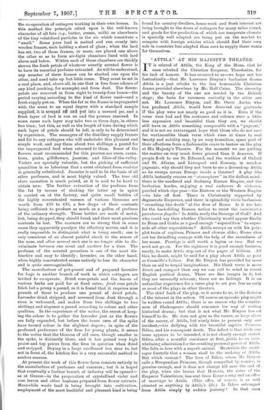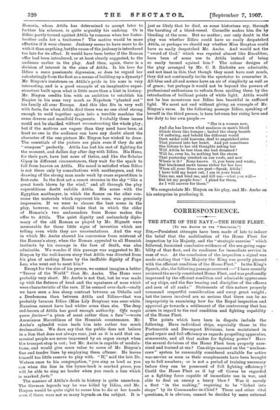"ATTILA" AT HIS MAJESTY'S THEATRE. TT is related of Attila,
the King of the Huns, that he once rebuked the Christian Emperor, Theodosius, for his lack of honour. It has occurred to us—we hope not too fantastically—that Mr. Laurence Binyon's barbarian drama Attila is a just rebuke to the less honourable Christian drama provided elsewhere by Mr. Hall Caine. The sincerity and the beauty of the one are needed by the British stage; the baits for ravenous curiosity in the other are not. Mr. Laurence Binyon, and Mr. Oscar Asche, who has produced Attila, would have deserved our gratitude if the play were not nearly so good as it is. Even if the verse were bad and the costumes and colours were a little less expensive and beautiful than they are, we should still have in Attila something comparable with a "pageant," and it is not an extravagant hope that those who do not care for workmanlike blank verse which rises at times to real beauty and nobility may, by an easy transition, spare part of their affections from a fashionable craze to bestow on the play at His Majesty's Theatre. For the moment we are putting the matter on very much lower ground than it deserves. If people flock to see St. Edmund, and the worthies of Oxford and St. Albans, and Liverpool and Romsey, in meadow pageants, why should they not burn to see a dressed-up Attila as he sweeps across Europe inside a theatre? A play like Attila instantly creates an " atmosphere " in the dullest mind : there is the sundered and declining Roman Empire, and the barbarian hordes, enjoying a real embarras de richesses, puzzled which ripe pear—the Eastern or the Western Empire —to bite off first. There is Christianity supported by degenerate Emperors, and there is splendidly virile barbarism "crouching like death" at the door of Rome. Is it too late for the backsliding Roman nation to resist the imminentia peccatorum flagella ! Is Attila really the Scourge of God ? And who could say then whether Christianity would appear finally to Huns and Goths as a good enough "superstition" to super- sede all other superstitions? Attila sweeps on with his poly- glot train of captives, Princes and clowns alike; Rome ekes out her dwindling courage with the help of the sacredness of her name. Prestige is still worth a legion or two. But we need not go on. For the sightseer it is good enough business, surely, to make Attila step out of the pages of Gibbon. All this, no doubt, might be said for a play about Attila as poor as Corneille's failure. But Mr. Binyon has provided far more than an aid to torpid imaginations. His blank verse is more direct and compact than any we can call to mind in recent English poetical drama. There are fine images in it, but they are unusually relevant; there are no frillings. It is an unfamiliar experience for a verse-play to set you free as early as most of the plays in other theatres.
The chief fault of the play, as it seems to us, is the division of the interest in the action. Of course an episodic play might be written round Attila; there is no reason why the country- men of Shakespeare should renounce his way of writing historical drama ; but that is not what Mr. Binyon has set himself to do. He does not give us the career, or large slices of the career, of Attila, but wisely tries to present only one incident,—Lis dallying with the beautiful captive Princess Ildico, and his consequent death. The defect is that while one issue appears to be intended, it is not clearly enough stated.
Ildico, after a scornful resistance at first, yields to an over- whelming admiration for the crushing personal power of Attila.
She falls in love with a superb animal. Meanwhile the sooth- sayer foretells that a woman shall be the undoing of Attila. But which woman ? The love of Ildico, whom Mr. Binyon calls a Burgundian Princess, though compelled by wonder, is
genuine enough, and it does not change till near the end of the play, when she learns that Honoria, the sister of the Emperor Valentinian, has sent from Rome a ring and an offer of marriage to Attila. (This offer, of course, is as well attested as anything. in Attila's life.) Is Ildico estranged from Attila simply by sudden jealousy ? In that case
Honoria, whom Attila has determined to accept later to further his schemes, is quite arguably his undoing. Or is Ildico partly turned against Attila by remorse when her foster- brother calls her a traitoress P The motive would be more effective if it were clearer. Jealousy seems to have more to do with it than anything, but the cause of the jealousy is introduced too late for its effect. It would have been better if the Roman offer had been introduced, or at least clearly suggested, to the audience earlier in the play. And then, again, there is a division of interest in the aims of Attila. Is his love for Ildico a mere passionate digression, or does he regard her calculatingly from the.first as a means of building up a dynasty? Mr. Binyon's insistence on Attila's pride in his sons is very interesting, and is 'a good example of an imaginative super- structure built upon what is little more than a hint in history. Mr. Binyon credits him with an ambition to establish his Empire in his sons very much as Napoleon "planted out" his family all over 'Europe. And this idea fits in very well with facts, for when Attila died there was no one chief strong enough to weld together again into a terrible machine the same diverse and manifold fragments. krobably these issues could not be clarified withopt reconstructing the whole play ; but if the motives are vaguer than they need have been, at least no one in the audience can have any doubt about the character of the one picture Mr. Binyon has wished to draw. The essentials of the picture are plain even if they do AU "compose" perfectly. Attila has lost his zest of fighting for the moment, and dallies day after day with Ildico. His Huns, for their part, have lost none of theirs, and like the Scholar Gipsy in different circumstances, they wait for the spark to fall from heaven on Attila. His mood is satisfied when Ildico is not there only by consultations with soothsayers, and the drawing of the strong man made weak by crass superstition is first-rate. In the first act a comet streams in the sky "like a great torch blown by the wind," and all through the play superstitious doubt enfolds Attila. His scene . with the Egyptian soothsayer, in which the flames on the altar con- sume the materials which represent his sons, was genuinely impressive. If we were to choose the best scene in the play, however, we should take that in which the elder of Honoria's two ambassadors from Rome makes the offer to Attila. The quiet dignity and melancholy diplo- macy of the old Roman as played by Mr. Hignett were memorable for those little signs of invention which are telling even while they are unostentatious. And the way in which Mr. Asche showed his conversion from mistrust of the Roman's story, when the Roman appealed to all Hunnish instincts by his courage in the face of death, was also admirable. We wonder if this passage was suggested to Mr. Binyon by the well-known story that Attila was diverted from his plan of sacking Rome by the ineffable dignity of Pope Leo, who went out to meet him ?
Except for the size of his person, we cannot imagine a better "Terror of the World" than Mr. Asche. The Huns were probably very short. Mr. Asche is not that, but be was made up with the flatness of head and the squatness of nose which were characteristic of the race. If he seemed over-dark—really we have seen a less sharp contrast between an Othello and Desdemona than between Attila and Ildico—that was probably because Ildico (Miss Lily Brayton) was over-white.
Nausicaa cannot have had whiter arms than she. The deep
red-brown of Attila has good enough authority. Offa magic quam facies—" a piece of meat rather than a face "—wrote
Ammianus Marcellinus of the Hunnish countenance. Mr.
Asche's splendid voice leads him into rather too much declamation. We dare say that the public does not believe in a lion that does not always roar, just as it is said that un- musical people are never impressed by an organ except when the trumpet-stop is out ; but Mr. Asche is capable of modula- tions, and would give more value to some of Mr. Binyon's fine and tender lines by employing them oftener. He leaves himself too little reserve to play with. "If." said the late Dr.
Watson once to his congregation, "you sing as loud as you can when the line in the hymn-book is marked piano, you will .be able to sing no louder when you reach a line which is marked forte."
The manner of Attila's death in history is quite uncertain. The German legends 'say he was killed by Ildico, and Mr.
Binyon would be quite right to cause him to die at her hands even if there were not so many legends on the subject. It is just as likely that he died, as some historians say, through the bursting of a blood-vessel. Corneille makes him die by bleeding at the nose. But no matter; our only doubt in the play was whether Ildico could have so easily despatehed Attila, or perhaps we should say whether Miss Brayton could have so easily despatched Mr. Asche. And would not the "sword of God," which was reputed almost' like Excalibur, have been of some use to Attila instead of being so easily turned against him ? The • colour designs of the play arranged by Mr. C. S. Ricketts are admirable, and not least in this, that though they must have cost much., they did not continually invite the spectator to remember it. All-blue and all-red scenes have an air of simplicity as well as of grace ; but perhaps it would not be beyond the powers of professional enthusiasm to refrain from spoiling them by the introduction of brilliant points of white light. Attila would not be less monstrous nor Ildico less beautiful in suffused light. We must not end without giving an example of Mr. Binyon's verse. In the following passage Ildico, speaking of herself in the third person, is torn between her rising love and her duty to her own people :— "She is a woman now,
And she has known what madness in men's blood Blinds them like hunger ; tasted the sharp breath Of suffering, and beheld the different world Dark under cold heavens, deaf to anguished cries That pierced into her heart. And yet sometimes She listens to her old thoughts asking her Will Attila be less than she had dreamed ? Will he, even he, be nothing but the storm That yesterday crashed on our roofs, and now Where is it ? None knows. 0, you burn and waste; But blackened earth teems richer for her loss When all your Huns are past—Speak, Attila! I have told my heart out, I am in your hand. Take me, and bind me, and kill me,—what you will— But let my people free ! Iplead for them, As I will answer for them."
We congratulate Mr. Binyon on his play, and Mr. Asche on his enterprise in producing it.







































 Previous page
Previous page